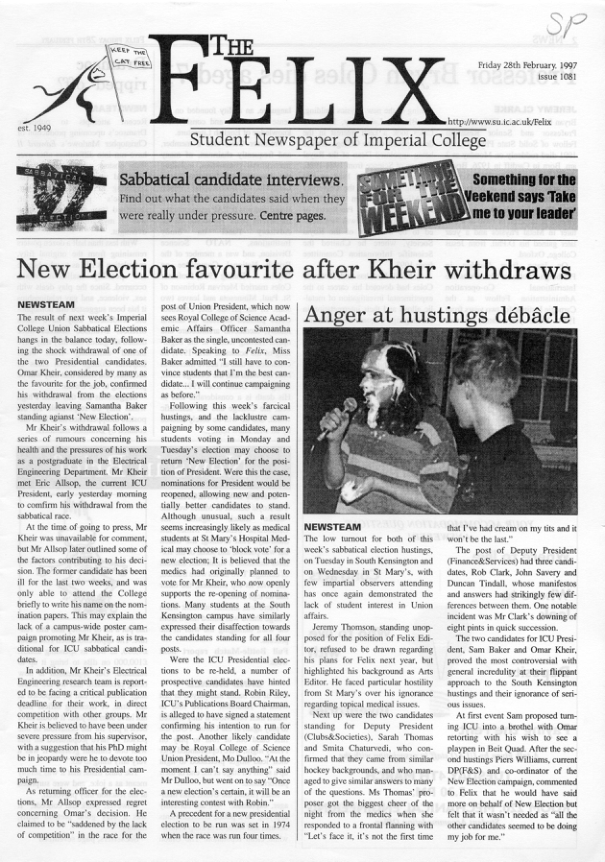Voting made simple
The Single Transferable Vote (STV) used in Imperial College Union elections is a more sophisticated, and some would say more complicated system, to the nationally used first past the post policy. STV allows students to specify not just their first choice of candidate, but also their second, third and fourth. In the interests of ‘transparency’ and in order to allow you to best use your vote, below is a short description of how it all works.
Filling out the ballot paper is clearly where it all starts, and the number of votes you get depends on the number of candidates. With a maximum of four choices in this year’s elections you get to list your preference from 1 to 4, with your most favoured person getting a 1, the next a 2 etc. If you only have eyes for one candidate then you do not need to pick a 2,3 or 4, your vote is still valid. In this instance you should still however use a 1, rather than a tick or a cross.
When all the tens of thousands of ballot papers are collected initially only the 1s are considered and each candidate’s first preference vote is counted. To win an ICU sabbatical election in the first round, a candidate needs to receive more than 50% of the valid votes. If one of the candidates has achieved this wonderful ideal, he is declared the winner and the count is finished.
If however, as is more likely, none of the possibles has managed to inspire such a level of support the second round of counting kicks in. The candidate with the least number of votes is now eliminated and his papers re-examined to consider his voters second preferences. All the 2s are now distributed to the remaining candidates and the totals recalculated.
This process continues until one candidate reaches the magical 50% figure. While this may seem a protracted system, counting is unlikely to take as long as one recent election in one of the UK’s near neighbours where over seven days of counting was needed to elect one particular member of Parliament.
Just in case the above still sounds complicated here’s an example of what might happen:
Imagine in an ideal world where the Spice Girls suddenly grew brains and were all studying at Imperial College. Being ambitious types they all decide to run for Imperial College Union President, opposed of course by the ubiquitous New Election.
Suppose having examined their policies in detail you reckon that the two Mels are on the ball but the rest are rather lacking in the ideas department you might decide to vote like this:
Mel C 1
Mel B 2
New Election 3
Emma 4
Victoria 5
Geri 6
All the votes are counted, with the highest turnout ever for an ICU election, and each candidate polls as follows:
Emma 3,000
Mel B 1,500
New Election 800
Mel C 700
Geri 600
Victoria 400
Spoilt Papers 100
A total of 7,100 people vote, but unfortunately 100 didn’t read this advice and failed to fill in their ballot paper properly. This therefore leaves quota, or number votes needed for success, at 3,501 or + 1. Clearly Emma falls just short of the target so now Victoria’s first preference vote is examined and her 2s are counted. Of the 400 papers, 300 have given Emma a 2, 50 have given Geri a 2 and another fifty only had eyes for Victoria. This leaves the recounted votes like this:
Emma 3,300
Mel B 1,500
New Election 800
Mel C 700
Geri 650
Spoilt Papers 100
Non Transferable 50
The new quota is now 3,301 or + 1, which Emma just misses. Next for the chop is Geri and her 600 1st preference and the 50 votes she got from Victoria are now examined for their respective 2s and 3s. These are then added to the previous figures and the totals are now as follows:
Emma 3,600
Mel B 1,500
Mel C 1,000
New Election 800
Spoilt Papers 100
Non Transferable 100
Emma has jumped her final hurdle and is duly elected as the President of Imperial College Union, to tumultuous applause





